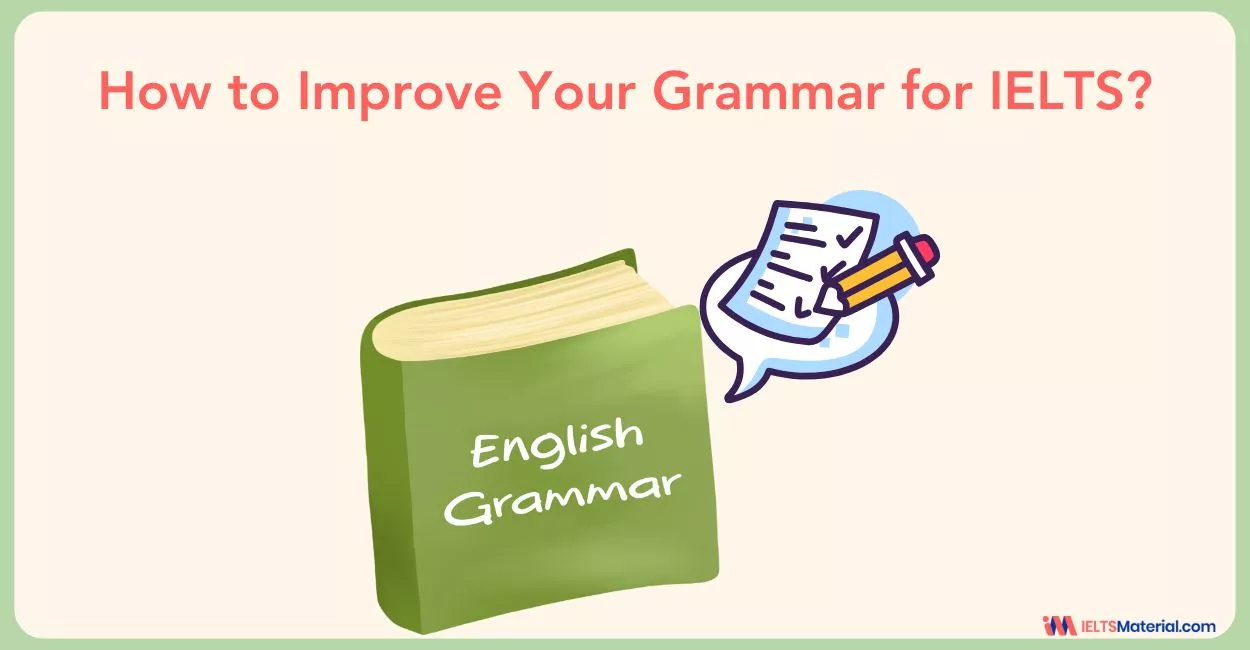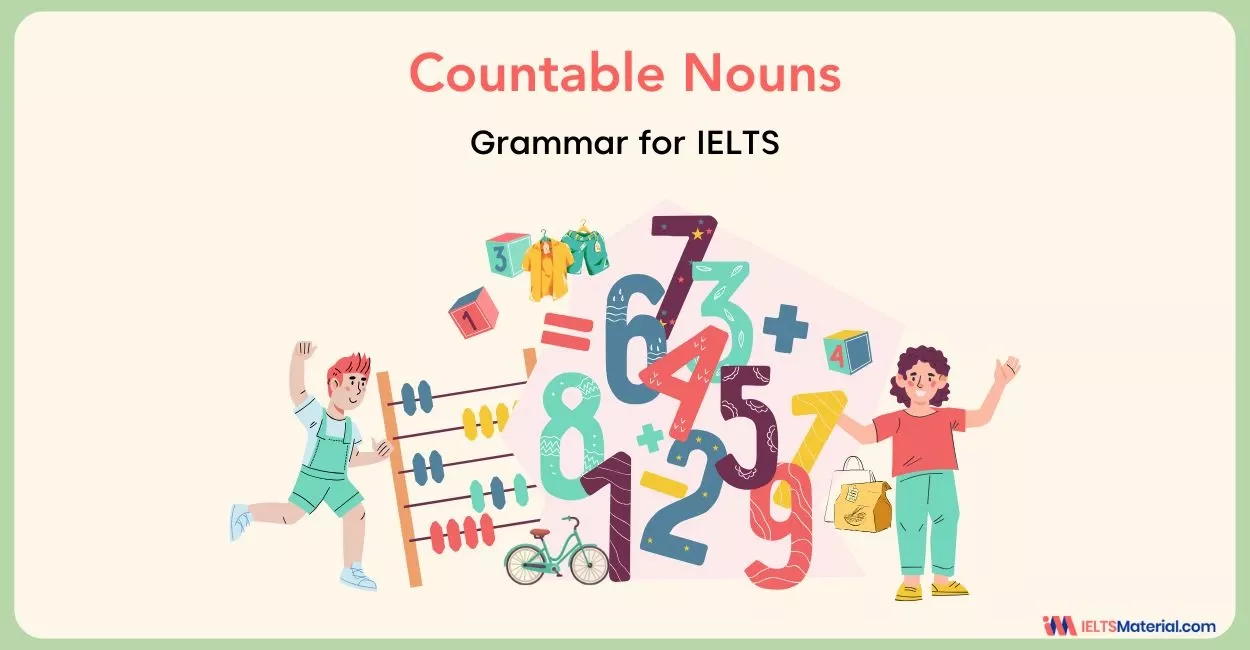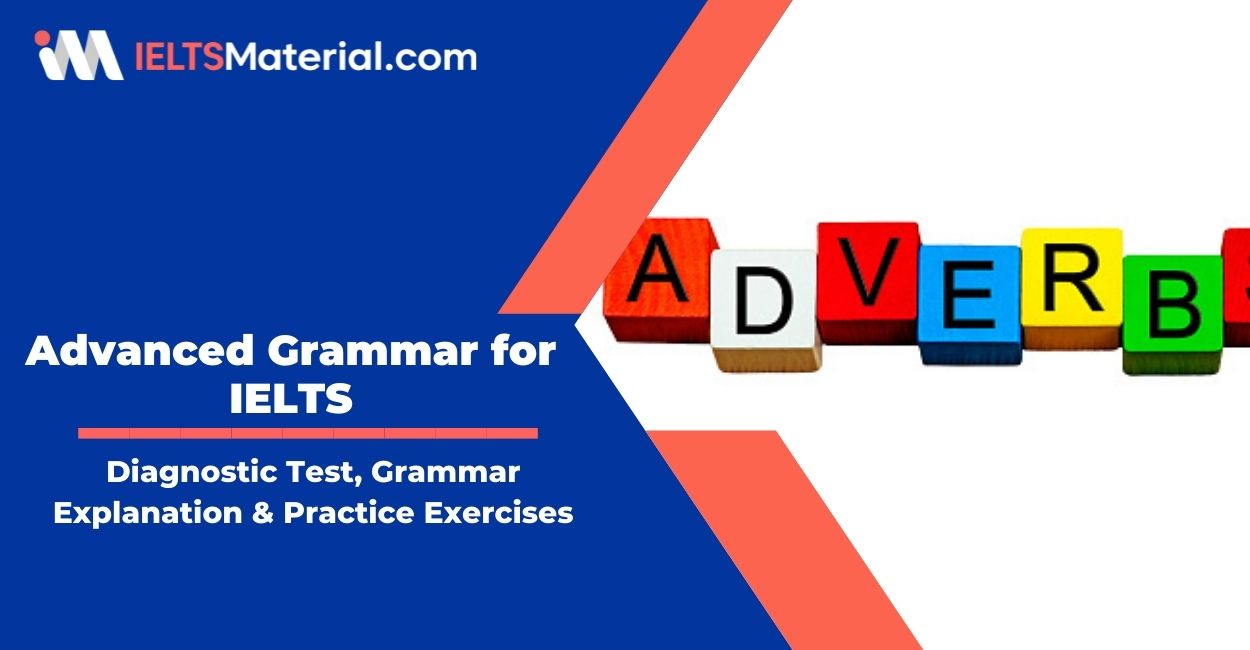Develop your Grammar from our Grammar Topics
How to Improve Your Grammar for IELTS?
Grammar is one of the most crucial aspects of the IELTS exam. Whether it is the writing and speaking tasks or even indirectly in the reading and listening modules, a strong grasp of grammar can make a big difference in your band score. Many candidates lose marks not because of poor ideas but because of repeated grammar errors. If you want to achieve an IELTS band 7 or higher, you should learn how to improve your grammar for IELTS. Therefore, in this blog, we will explore practical strategies on how to improve IELTS grammar with clear explanations and examples. Role of Grammar...

5 min read
Updated On
Grammar For IELTS: Diagnostic Test, Explanation and Practice Exercises for IELTS Academic & IELTS General Training
A strong command of grammar is essential for success in IELTS Academic and General Training. One of the most common areas where test-takers struggle is with gradable and ungradable adjectives. Using the wrong modifier (e.g., absolutely cheap instead of very cheap) can make your sentences sound unnatural and lower your band score. This guide provides you with a diagnostic test, grammar explanation, and practice exercises to help you master this tricky but important IELTS grammar topic. Diagnostic Test: Gradable and Ungradable Adjectives Tick (✓) the correct sentences and underline the mistakes. Examples: Some of these new laptops are hideously expensive....

5 min read
Updated On
Countable Nouns: Grammar For IELTS
Countable nouns are one of the most essential grammar concepts in English. They form the backbone of clear communication, especially in the IELTS exam, TOEFL, and academic writing. However, learners often confuse them with uncountable nouns or misuse them without articles and determiners. In this blog, we will start with a diagnostic test to check your understanding, then explain the rules in detail with examples, and finally, end with challenging exercises with answer keys to help you master countable nouns for IELTS. Quick Diagnostic Test for Countable Nouns Choose the correct option for each sentence. 1 She bought ___ apples from...

7 min read
Updated On
Possessives and Compound Nouns: Advanced Grammar for IELTS
IELTS Grammar is an essential part of every language, and IELTS assesses an individual on various aspects of their skills in the English language. One of the most mandatory skills that a candidate must demonstrate to obtain a higher IELTS band score is the use of advanced grammar, such as Possessives and Compound Nouns. Therefore, it is important to keep in mind that the application of useful grammar for writing and speaking tasks can significantly improve your overall performance. In this article, we have discussed rules, usage, and examples for Possessives and Compound Nouns, followed by practical exercises and answer...

23 min read
Updated On
Advanced Grammar for IELTS With Comparative and Superlative Exercises
One of the basic requirements that needs to be fulfilled by IELTS candidates is to have a good grasp of grammar. In order to achieve a high IELTS band score, it is important to have advanced knowledge and understanding of the use of grammatical structures and devices. In this article, we have covered the topic of comparison to help you understand its use in various situations. It includes a diagnostic test, grammar explanation and practice exercises for advanced comparative structures and degrees of comparison! Advanced Grammar for IELTS: Comparison – Diagnostic Test, Grammar Explanation & Practice Exercises The items compared...

21 min read
Updated On
Especially vs Specially for IELTS Grammar: Lessons, Examples, Usage & Exercises
Many IELTS candidates find themselves puzzled when it comes to the words ‘especially’ and ‘specially’. While they look and sound similar, they are not always interchangeable. These two adverbs are commonly tested in IELTS Writing and Speaking, where using the right one can reflect a strong command of English vocabulary and grammar. In this blog, you will learn the precise meanings of both words, their usage, real-world examples relevant to IELTS topics, common mistakes to avoid, and practice exercises with an answer key. Let’s dive in! What Does ‘Especially’ Mean? ‘Especially’ is used to emphasize one item or person more than the...

6 min read
Updated On
Adverbs: Advanced Grammar for IELTS
If you want to look professional in your exam or communication, we recommend you make use of adverbs for IELTS to give your ideas about the sentence. Adding the adverbs in front of the sentences may help you to express the meaning, as well as help you improve your IELTS grammar. This will help the examiner to know what you are going to say next in a sentence. In this blog, we learn what is an adverb and its types, take a diagnostic test to determine your basic understanding of adverbs, go through lessons on forms, collocations, and round it up...

24 min read
Updated On
Relative Clauses for IELTS: Diagnostic Test, Grammar Explanation & Practice Exercises
When aiming for a high band score in the IELTS exam, grammar can be the deciding factor between a 6.5 and a 7.5. Among the many advanced grammar topics tested, relative clauses for IELTS play a crucial role in showing grammatical range, clarity, and fluency, especially in the writing and speaking sections. In this blog, you will learn what relative clauses are, why they matter for the IELTS exam, and how to use them correctly. You will also take a diagnostic test, go through detailed lessons, and try targeted practice exercises to master this essential grammar topic and move closer...

23 min read
Updated On
Preposition: Advanced Grammar for IELTS
If you are preparing for the IELTS exam, mastering prepositions is not optional, it is an essential advanced grammar for IELTS topic. Prepositions are one of the most frequent sources of grammatical mistakes in IELTS Writing and Speaking tasks. A single incorrect preposition can change the meaning of a sentence or make your response sound unnatural, directly affecting your Grammatical Range and Accuracy score. As a result, in this blog, we will explore the importance of prepositions in the IELTS exam, take a diagnostic test to evaluate your existing knowledge, offer proven, effective strategies to master them effectively, followed by...

28 min read
Updated On
Confusing Verbs: Advanced Grammar for IELTS
When preparing for the IELTS exam, one of the biggest challenges many candidates face is mastering grammar accuracy, and confusing verbs for IELTS grammar often cause unnecessary errors in writing and speaking tasks. These are verbs that look or sound similar but differ in meaning, usage, or grammatical structure. Misusing them can significantly reduce your IELTS band score, especially in Lexical Resource and Grammatical Range and Accuracy. This blog will explore the most commonly confused verbs in IELTS, explain their differences, provide sentence examples, and give you practice exercises to master these pitfalls and avoid them. Confusing Verbs: Advanced Grammar for...

23 min read
Updated On
Advanced Grammar for IELTS: Conditionals - Diagnostic Test, Grammar Explanation & Practice Exercises
Conditionals are usually used as types, and they are mainly used in Writing Task 2 of the IELTS examination. These are used to mention the facts or the unreal situation in the given questions or paragraphs. Based on the conditions given, you need to give the results in the past or the future. Below are some diagnostic tests, grammar explanations, and a practice test is given that will help you with the actual IELTS exam! Diagnostic Test Conditionals Twelve of these conditional sentences contain a mistake or may be considered incorrect by most English speakers. Tick (✓) the correct sentences, and...

26 min read
Updated On
Using Modal Verbs for Writing & Speaking: Advanced Grammar for IELTS
Using Modal Verbs for Writing & Speaking is important to achieve a band 8+ in your IELTS exam. Mastering modal verbs like ‘must’, ‘should’, ‘ought to’, ‘have to’, and ‘need to’ is crucial for making different sentence structures and using them appropriately based on context. By understanding the advanced grammar rules as well as a few tips to use these modal verbs, you will be able to achieve a high IELTS Band Score. Since advanced grammar rules play a pivotal role in your IELTS preparation, you should be aware of your level of understanding of modal verbs before diving into...

25 min read
Updated On
Mastering Verb-ing forms and Infinitives: Advanced Grammar for IELTS
Mastering Verb-ing forms and Infinitives is crucial, especially to enhance your skills in using complex grammar structures. With consistent practice, these advanced grammar structures boost your IELTS performance and IELTS Band Score. Since you will be assessed on the parameter of Grammatical Range and Accuracy, practising topics in Advanced Grammar for IELTS plays a pivotal role. However, you would also need to utilize a few tricks so that you not only learn Verb-ing forms and Infinitives but also use them in your daily life as well as while practising with test papers. Remember to prepare such grammar topics in the...

25 min read
Updated On
Advanced Grammar Structures for IELTS to Achieve Band 7+
The IELTS Grammar is an essential part of every language which is used to assess an individual on various aspects of their skills in the English language. With a strong hold over grammar by using Advanced Grammar Structures for IELTS, you can express your ideas clearly and accurately, which is very important for attaining a high band score in the IELTS Exam. One of the most mandatory skills that a candidate must demonstrate to obtain a higher IELTS Band Score of 7+ is the use of advanced grammar structures for writing and speaking tasks. Therefore, it is important to keep in...

4 min read
Updated On
Advanced Grammar for IELTS: Emphatic structures exercises and inversion
Check out some important concepts from Advanced IELTS Grammar and practise the exercises given below to enhance your language skills.Advanced Grammar for IELTS: Emphatic Structures and Inversion – Diagnose Test, Grammar Explanation & Practice ExercisesMake the sentences more emphatic by rewriting them, beginning with the word(s) in brackets!Example: They are doing something quite unprecedented. (What) => What they are doing is quite unprecedented The shellfish made Jasmine sick. (It was) Greg lost the office keys. (It) He’s approaching the problem from an entirely new angle. (What) They’ve done something unforgivable. (What) I came by bus because my car has broken...

21 min read
Updated On
















